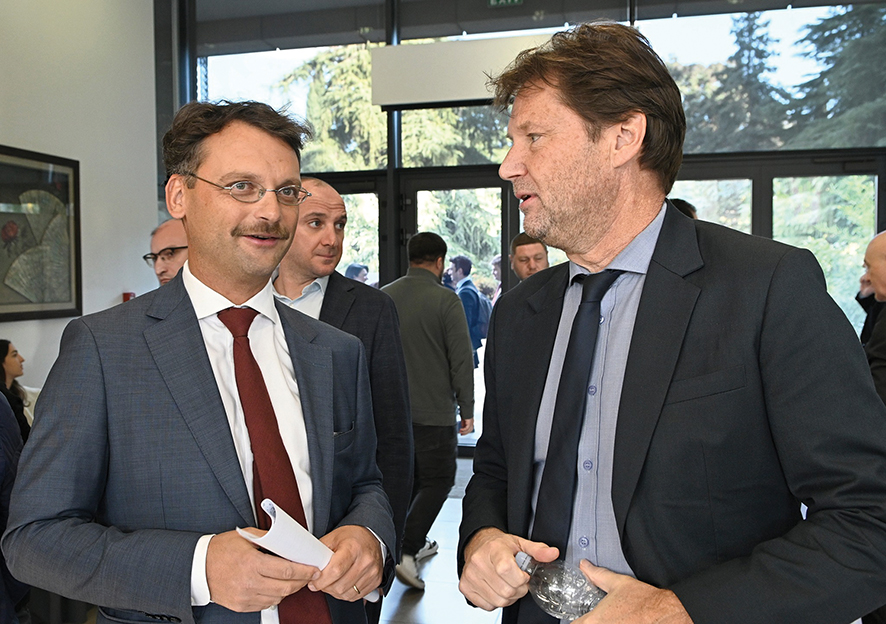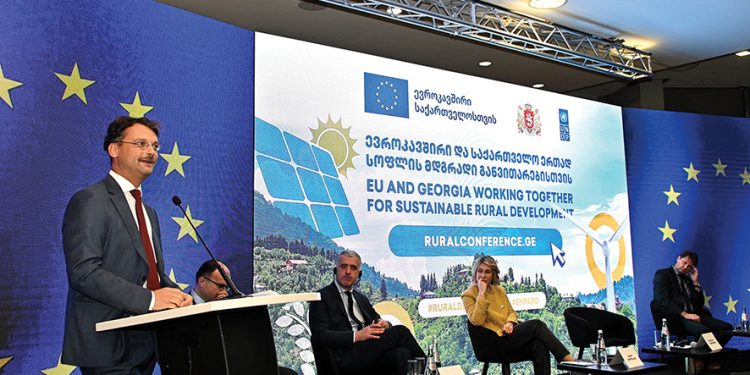In pursuit of EU membership, Georgia is advancing its institutional reforms, with agriculture and rural development playing an important role in this transformative journey. The Government of Georgia convened the Rural Development Conference to enhance policy reforms and foster coordination, bringing together national stakeholders, international partners, and rural development experts from EU Member States.
Georgia’s Ministry of Environmental Protection and Agriculture hosted this high-level forum with funding from the European Union and in cooperation with the United Nations Development Program (UNDP).
Otar Shamugia, Minister of Environmental Protection and Agriculture of Georgia, and Catalin Gherman, Deputy Head of the Cooperation Section at the Delegation of the European Union to Georgia, opened a discussion by highlighting the indispensable role of rural development in driving Georgia’s regions forward, improving the well-being of its people, and facilitating a seamless transition to a greener economy.
“Georgia has made significant strides in the last decade through rural development programs, institutional reforms, and the adoption of European approaches. As we draw closer to the European Union, our objective is to build on these achievements, working with partners to set rural development priorities and design interventions aligning with the EU Common Agricultural Policy,” noted Minister Shamugia.
“Sustainable and green rural development will improve the lives of over 40% of Georgians living outside major cities, fostering opportunities for entrepreneurship, education, and environmental protection,” Catalin Gherman noted. “With support from the European Union, Georgia made notable progress in institutional reforms aimed at aligning its rural development frameworks with the EU Common Agricultural Policy. We remain committed to working with the government, civil society, the private sector, and communities on this developmental journey. One of the most important components in this context is the EU’s LEADER program—a bottom-up initiative designed to bolster the growth of rural areas by implementing projects that directly address local needs. We look forward to the forthcoming implementation of the established mechanism in Georgia, facilitating state financing for rural development projects spurred by LEADER initiatives.”

The Rural Development Conference featured insightful panel discussions involving Georgian and European officials, practitioners, and experts. Key topics included policy frameworks for sustainable rural development and agriculture, harmonization of Georgian policies with the EU Common Agriculture Policy, the transition to a greener economy in line with the EU’s Green Deal, digital solutions for monitoring and control systems, and funding mechanisms available for EU membership candidate countries.
Experts from Austria, Italy, Latvia, Serbia, and North Macedonia shared their countries’ experiences implementing the EU’s Common Agricultural Policy and the Instrument of Pre-Accession Assistance in Rural Development (IPARD).
Summarizing the conference outcomes, Douglas Webb, UNDP Resident Representative a.i. in Georgia, underscored its significance as a step toward equitable rural development. “Georgia has every opportunity to foster vibrant rural economies that benefit the people and contribute to the country’s prosperity. Our goal is to empower rural communities by ensuring sustained attention from decision-makers, that engages the private sector and civil society, and harnesses best practices from European countries.”
###
More information on the Rural Development Conference is available on the website.
###
The EU and UNDP support for rural development in Georgia draws on the EUR 234.5 million EU-funded European Neighbourhood Programme for Agriculture and Rural Development (ENPARD) implemented since 2013. More information is available on the website: https://eu4georgia.eu/enpard














